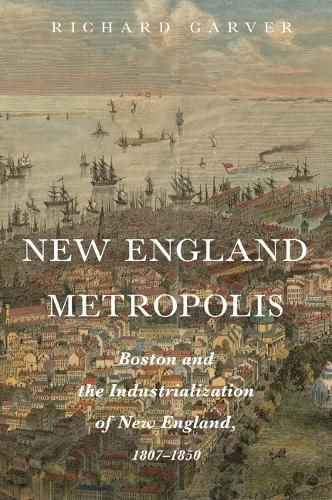Readings Newsletter
Become a Readings Member to make your shopping experience even easier.
Sign in or sign up for free!
You’re not far away from qualifying for FREE standard shipping within Australia
You’ve qualified for FREE standard shipping within Australia
The cart is loading…






At the start of the nineteenth century, Boston was at its zenith as a maritime city even as New England was in decline. Many struggling farmers abandoned the area for more promising opportunities to the west. Yet by 1850, New England had been transformed into one of the most industrialized regions in the world. Former agricultural villages had become specialized manufacturing towns producing consumer goods for sale, and Boston merchant capitalists had established textile complexes that produced fabrics in huge quantities. Although Boston had been superseded by New York as a trading center, it thrived not only as a financial market but as an exchange hub in which these hinterland manufacturers acquired raw materials, capital, sales services, and transportation. With Boston at its metropolitan center, New England was transformed into an industrial geography that was unique nationally and internationally.
New England Metropolis demonstrates that, in contrast to the course of industrialization in other regions of the country, New England's transformation was driven by rural entrepreneurs and Boston merchant capitalists who recruited underemployed agricultural household members to produce consumer goods. These products reached markets in the West, the South, and the Caribbean, particularly in Cuba. The adaptation of commercial, financial and transportation infrastructure developed to serve Boston's overseas trade to the needs of hinterland manufacturers made their rise possible, halted New England's decline and, by 1850, had propelled it to prosperity.
$9.00 standard shipping within Australia
FREE standard shipping within Australia for orders over $100.00
Express & International shipping calculated at checkout
At the start of the nineteenth century, Boston was at its zenith as a maritime city even as New England was in decline. Many struggling farmers abandoned the area for more promising opportunities to the west. Yet by 1850, New England had been transformed into one of the most industrialized regions in the world. Former agricultural villages had become specialized manufacturing towns producing consumer goods for sale, and Boston merchant capitalists had established textile complexes that produced fabrics in huge quantities. Although Boston had been superseded by New York as a trading center, it thrived not only as a financial market but as an exchange hub in which these hinterland manufacturers acquired raw materials, capital, sales services, and transportation. With Boston at its metropolitan center, New England was transformed into an industrial geography that was unique nationally and internationally.
New England Metropolis demonstrates that, in contrast to the course of industrialization in other regions of the country, New England's transformation was driven by rural entrepreneurs and Boston merchant capitalists who recruited underemployed agricultural household members to produce consumer goods. These products reached markets in the West, the South, and the Caribbean, particularly in Cuba. The adaptation of commercial, financial and transportation infrastructure developed to serve Boston's overseas trade to the needs of hinterland manufacturers made their rise possible, halted New England's decline and, by 1850, had propelled it to prosperity.